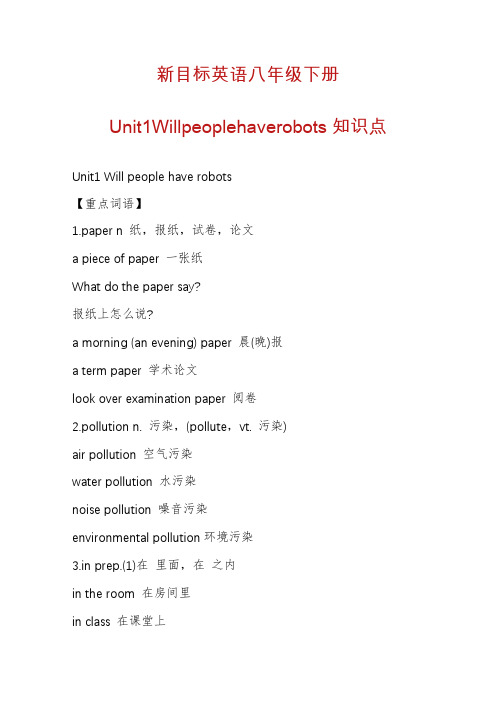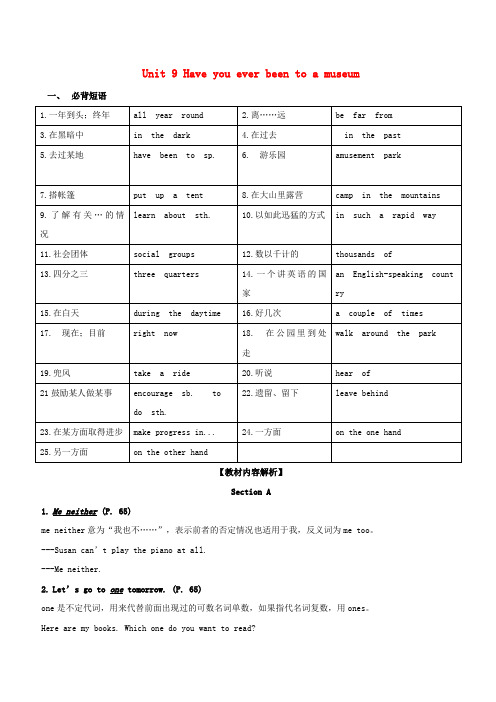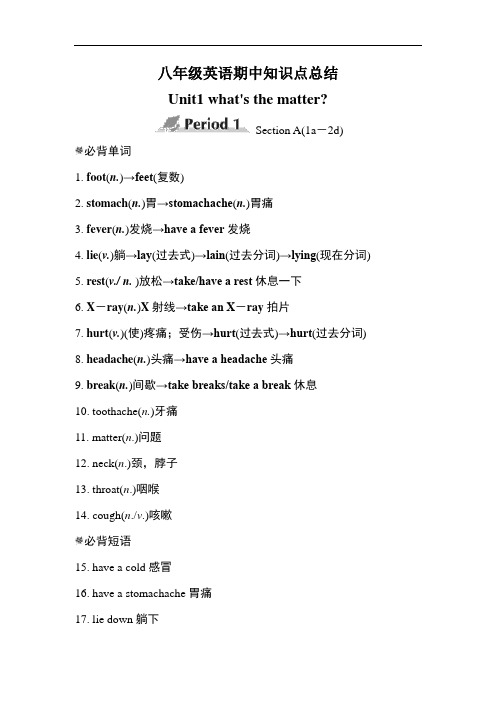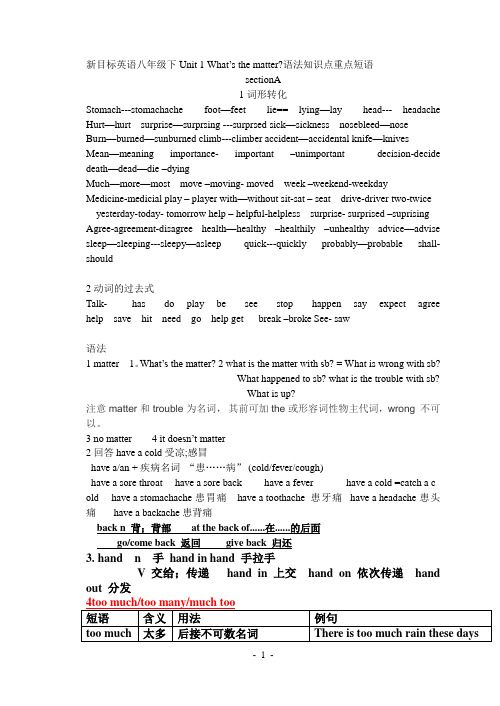新目标八年级下册各单元知识点及语法
新目标英语八年级下册Unit1Willpeoplehaverobots知识点

新目标英语八年级下册Unit1Willpeoplehaverobots知识点Unit1 Will people have robots【重点词语】1.paper n 纸,报纸,试卷,论文a piece of paper 一张纸What do the paper say?报纸上怎么说?a morning (an evening) paper 晨(晚)报a term paper 学术论文look over examination paper 阅卷2.pollution n. 污染,(pollute,vt. 污染)air pollution 空气污染water pollution 水污染noise pollution 噪音污染environmental pollution环境污染3.in prep.(1)在里面,在之内in the room 在房间里in class 在课堂上(2)在(某段时间)之间in the morning 在早上in the past 在过去I′ll come back in a day or two我过一两天就会回来in,after,later 接时间段,都可表示“(一段时间)之后”,它们有什么区别呢?①“in+一段时间”指“(将来的)一段时间之后”。
What will you be in five years?五年之后你干什么?We’ll start off in ten minutes.我们十分钟后出发。
②“after+一段时间”或“一段时间+later”表示“(在过去某个时间看来)一段时间之后”。
He went home after two days.他两天后回家了。
Three years later,she had a baby.三年后,她生了一个婴儿。
4.less adj. 较少的;少量的(little的比较级)They buy less beer and fewer cigarettes now现在他们买的啤酒和香烟比以前少了。
八年级下册英语知识点[新目标八年级英语知识点总结]
![八年级下册英语知识点[新目标八年级英语知识点总结]](https://img.taocdn.com/s3/m/fb83419d50e79b89680203d8ce2f0066f53364ab.png)
新目标八年级英语知识点总结新目标八年级英语知识点总结(一) 1、too…to… (1)too…to句型,形式上是肯定的,但表达否定意义,意为“太…而不能…”。
too后接形容词或副词的原级,to后接动词不定式。
He i too young to go to chool. 他太小了而不能去上学。
(2)too…to…表否定意义时,可与o…that…或not enough to互换。
1)too…to…结构同o…that结构的互换。
too…to…结构是一个简单句;而o…that是一个复合句,o后接形容词或副词,that 后接从句。
转换时that后的从句要用否定形式。
The man i too old to go to work. = The man i o old that he can’t go to work. 这个人岁数太大,不能去工作了。
2)too…to…结构同not…enough to…结构的互换。
enough前的形容词或副词必须与too后的形容词或副词意义相反。
The bo某 i too heavy for him to lift. = The bo某 i not light enough for him to lift.这个盒子太重了,他拿不动。
(3)too…to…句型在以下三种情况下表达肯定意义。
1)当too前有not;never;nothing等表示否定意义的词时,too…to…就不表示否定意义。
One i never too old to learn. 活到老,学到老。
2)如果too…to…结构前出现了only,则加强肯定语气,就无否定意义了。
only too 相当于very或very much。
I hall be only too pleaed to go home. 我将非常高兴地回家。
3)当too后有ad;happy;glad;pleaed等表示情感的形容词,则表示肯定意义。
He i too ad to hear the tory. 听到这个故事,他感到太伤心了。
(人教新目标)八年级英语(下)短语语法知识点汇总Unit9

Unit 9 Have you ever been to a museum 一、必背短语【教材内容解析】Section A1.Me neither (P. 65)me neither意为“我也不……”,表示前者的否定情况也适用于我,反义词为me too。
---Susan can’t play the piano at all.---Me neither.2.Let’s go to one tomorrow. (P. 65)one是不定代词,用来代替前面出现过的可数名词单数,如果指代名词复数,用ones。
Here are my books. Which one do you want to read?---I don’t like these dresses.---How about those ones over there.3.Let’s go somewhere different today. (P. 65)somewhere用作副词,表示“在某处、到某处”,常用于肯定句中,在否定句和疑问句中用anywhere。
It’s cold here. Let’s go somewhere else.Did you go anywhere last Sunday?4.They are going to take the subway. (P. 66)take the subway意为“乘地铁”,take用作动词,可以表示“乘、坐(车、船等)”。
We take the subway to work every day.5.It’s a great way to spend a Saturday afternoon. (P. 66)(1) way表示“方法”时,后常接动词不定式或者of doing作定语。
Can you think out a way to open the door/of opening the door?(2) spend的用法① sb. spend+时间/金钱+on sth. “在某事上花费多长时间或者多少钱”The man spent the whole day on his speech.The family spent 10,000 dollars on their trip.② sb. spend+时间+(in) doing sth. “花费多长时间做某事”The boy has spent two hours playing the computer games.【拓展】辨析spend, pay, take和cost6.We put up a tent and cooked outside. (P. 66)put up意为“搭建”,还可以表示“举起、张贴”。
人教新目标版八年级下册Unit2 I'll help to clean up the city parks单元知识点

Unit 2 I’ll help to clean up the city parks.课时 1 Section A(1a-2d)学习目标:一、掌握动词短语clean up, cheer up 的用法。
(重点)二、能用could, can’t, will等情态动词给出建议。
课堂导学:1.You could help to clean up the city parks.Clean up 为动副短语,意为“打扫干净”。
若后接代词作宾语,代词应放在clean和up中间;若后接名词作宾语,名词可放在两次之间或up之后。
She cleaned up the broken glass on the floor.即学即练一根据汉语意思完成句子我的房间很脏,所以我必须把它打扫干净。
My room is very dirty, so I have to .2.The girl could visit the sick kids in the hospital to cheer them up.短语2:cheer up使高兴;使振奋。
后接代词作宾语时,代词应放在cheer up中间.She failed the exam, and we want to cheer her up.即学即练二单项选择The child looked sad. Let’s .(选出与划线部分意思相同或相近的选项)A. happyB. make him happyC. shoutD. give help3.The boy could give out food at the food bank.短语3:give out 分发;散发;发放give out 是动副短语,意为“分发;散发;发放”,后接名词作宾语时,名词可放在短语后面,也可放在短语中间;后接代词作宾语时,代词只能放在短语中间。
其同义短语为“hand out”。
I saw a man giving out leaflets in the street.Give them out before class begins.即学即练三单项选择-Would you like to help me to the papers to the students, Tom?-Certainly, Miss Wang.A.give upB. give offC. give outD. give in4. We could put up signs.短语4:put up张贴;搭建Put up在该句中意为“张贴(布告)等”,此外它还可表示“公布;搭建;举起(手)等”。
新目标八年级下册英语各单元重点语法汇总

新目标八年级下册英语各单元重点语法汇总一. 询问健康及麻烦的表达方法1. 常用结构:What’s the matter (with sb.)?(sb.)怎么了?What’s wrong (with sb.)?(sb.)怎么了?What’s the trouble with sb? sb.出什么事了?What happened to sb? sb.发生了什么事?Are you OK? 你没事吧?Is there anything wrong with sb.?sb.有不舒服/麻烦吗?2. 要表达身体疼痛或不舒服,可用以下结构:①sb. have/has 病症The twins have colds.双胞胎感冒了。
②sb.have/has a headache/toothache/stomachache/backache. She had a stomachache last night. 她昨晚肚子痛。
③sb. have/has a sore 发病部位He has a sore throat. 他喉咙痛。
④sb. hurt(s) 身体部位或反身代词He hurt his leg. 他的腿受伤了。
⑤某部位hurt(s).My head hurts badly. 我头痛得厉害。
⑥sb. have/has a pain in one’s 身体部位I have a pain in my chest. 我胸口痛。
⑦(There is) something wrong with one’s 身体部位There is something wrong with my right eye. 我的右眼有毛病。
⑧其他表达方式She has a heart trouble. 她有心脏病。
He got hit on the head. 他头部受到了撞击。
She cut her finger. 她割破手指了。
二.情态动词should1. should为情态动词,意为“应该;应当”,否定式为shouldn’t,其后接动词原形,无人称和数的变化。
人教新目标八年级英语下册期中课本Units 1-6 知识点总结

八年级英语期中知识点总结Unit1 what's the matter?Section A(1a-2d)必背单词1. foot(n.)→feet(复数)2. stomach(n.)胃→stomachache(n.)胃痛3. fever(n.)发烧→have a fever发烧4. lie(v.)躺→lay(过去式)→lain(过去分词)→lying(现在分词)5. rest(v./ n. )放松→take/have a rest休息一下6. X-ray(n.)X射线→take an X-ray拍片7. hurt(v.)(使)疼痛;受伤→hurt(过去式)→hurt(过去分词)8. headache(n.)头痛→have a headache头痛9. break(n.)间歇→take breaks/take a break休息10. toothache(n.)牙痛11. matter(n.)问题12. neck(n.)颈,脖子13. throat(n.)咽喉14. cough(n./v.)咳嗽必背短语15. have a cold感冒16. have a stomachache胃痛17. lie down躺下18. take one's temperature量体温19. sound like听起来像20. take breaks=take a break休息必背句子21. What's the matter?怎么了?22. Yeah, I think I sat in the same way for too long without moving.是啊,我认为我是以同样的姿势坐着不动的时间太长了。
23. If your head and neck still hurt tomorrow, then go to a doctor.如果明天你的头和脖子还疼的话,就去看医生吧。
新目标英语八年级下Unit 1 What’s the matter语法知识点重点短语

新目标英语八年级下Unit 1 What’s the matter?语法知识点重点短语sectionA1词形转化Stomach---stomachache foot—feet lie== lying—lay head--- headache Hurt—hurt surprise—surprsing ---surprsed sick—sickness nosebleed—nose Burn—burned—sunburned climb---climber accident—accidental knife—knives Mean—meaning importance- important –unimportant decision-decide death—dead—die –dyingMuch—more—most move –moving- moved week –weekend-weekdayMedicine-medicial play – player with—without sit-sat – seat drive-driver two-twice yesterday-today- tomorrow help – helpful-helpless surprise- surprised –suprising Agree-agreement-disagree health—healthy –healthily –unhealthy advice—advise sleep—sleeping---sleepy—asleep quick---quickly probably—probable shall- should2动词的过去式Talk- has do play be see stop happen say expect agree help save hit need go help get break –broke See- saw语法1 matter 1。
2020年春人教新目标英语八年级下册Unit4-5知识点总结

2020年春人教新目标英语八年级下册Unit 4 Why don’t you talk to your parents?1..用于提建议的句型有:What about doing sth ?=How about doing sth?(1). 同意对方的建议时,一般用:….怎么样?.Let’s do sth . 让我们一起做某事吧。
Shall we/I do sth? 我们做…好吗?had better do/not do sth 最好做/不做某事Will/Would you please do sth 请你做…好吗?Would you like to do sth? 你想去做某事吗?Would you mind doing sth?你介意做某事吗?Why don’t you do sth?= Why not do sth?为什么不呢?◆Good idea./ That’s good idea. 好主意◆OK/ All right./ Great 好/ 行/太好了◆Yes, please ./ I’d love t o 是的/ 我愿意◆I agree with you 我同意你的看法◆No problem 没问题◆Sure/ Of course/ Certainly 当然可以◆Yes, I think so 对,我也这样想(2).对对方的帮助或要求表示委婉谢绝时,一般用:◆I don’t think so 我认为不是这样◆Sorry, I can’t对不起,我不能◆I’d love to, but…◆I’m afraid…我愿意,但恐怕……2. allow doing sth 允许做某事allow sb. to do sth 允许某人做某事be allowed to do sth 被允许做某事allow与let的辨析:allow指“允许”,表示“默许,听任,不加阻止”,allow sb to do sth 允许某人做某事。
- 1、下载文档前请自行甄别文档内容的完整性,平台不提供额外的编辑、内容补充、找答案等附加服务。
- 2、"仅部分预览"的文档,不可在线预览部分如存在完整性等问题,可反馈申请退款(可完整预览的文档不适用该条件!)。
- 3、如文档侵犯您的权益,请联系客服反馈,我们会尽快为您处理(人工客服工作时间:9:00-18:30)。
雪夏冰凝的空间新目标八年级下册 Unit 1 重点短语及句型总汇2009-08-09 14:40Unit 1 Will people have robots?重点短语及句型总汇1. fewer people 更少的人(fewer 修饰名词复数,表示否定)2. less free time 更少的空闲时间(less 修饰不可数名词,表示否定)3. in ten years 10年后(in 的时间短语用于将来时,提问用 How soon)4. fall in love with … 爱上……例:When I met Mr. Xu for the first time, I fell in love with him at once.当我第一次见到许老师,我立刻爱上他。
5. live alone 单独居住6. feel lonely 感到孤独(比较:live alone/ go alone 等)The girl walked alone along the street, but she didn't feel lonely.那女孩独自沿着街道走,但她并不感到孤独。
7. keep/ feed a pet pig 养一头宠物猪8. fly to the moon 飞上月球9. hundreds of + 复数数百/几百(概数,类似还有 thousands of; millions of)10. the same as 和……相同11. A be different from B A与B不同(= There is a difference/ Thgere are differences between A and B)12. wake up 醒来 (wake sb. up 表示“唤醒某人”)13. get bored 变得厌倦(get/ become 是连系动词,后跟形容词如 tired/ angry/ excited 等)14. go skating 去滑冰(类似还有 go hiking/ fishing / skating/ bike riding 等)15. lots of/ a lot of 许多(修饰可数名词、不可数名词都可以)16. at the weekends 在周末17. study at home on computers 在家通过电脑学习18. agree with sb. 同意某人(的意见)19. I don't agree. = I disagree. 我不同意。
20. on a piece of paper 在一张纸上(注意 paper/ information/ news/ work/ homework/ housework 等常考到的不可数名词)21. on vacation 度假22. help sb with sth/help sb do sth. 帮助某人做某事23. many different kinds of goldfish 许多不同种金鱼24. live in an apartment 住在公寓里;live on the twelfth floor 住在12楼25. live at NO.332,Shanghai Street 住在上海路332号26. as a reporter 作为一名记者27. look smart 显得精神/看起来聪明28. Are you kidding? 你在骗我吗?29. in the future 在将来/在未来30. no more = not … anymore 不再(强调多次发生的动作不再发生)31. no longer = not … any longer 不再(强调状态不再发生)32. besides(除……之外还,包括)与except = but(除……之外,不包括)33. be able to 与 can 能;会(be able to 用于各种时态,而 can 只能用于一般现在时态和一般过去时态中;have to 用于各种时态,而 must 只能用于一般现在时态)例如:① I have been able to/ will be able to speak two languages. (不可以用 can)② had to stay at home/ will have to (不可以用 must)34. be big and crowded 大而且拥挤34. be in college 在上大学35. live on a space station 住在空间站36. dress casually 穿得很随意;casual clothing 休闲服饰37. win the next World Cup 赢得世界杯;win award 获奖38. come true 变成现实39. take hundreds of years 花几百年的时间40. be fun to watch 看起来有趣41. over and over again 一次又一次42. be in different shapes 形状不同43. twenty years from now 今后20年本单元目标句型:1. What do you think life will be like in 1000 years?2. There will be fewer trees、more buildings and less pollution in the future. fewer;less 表示否定之意,分别修饰可数名词和不可数名词;more 二者都可以修饰。
3. Will kids go to school? No, they won't/ Yes, they will。
4. Predicting the future can be difficult.5. I need to look smart for my job interview.6. I will be able to dress more casually.7. I think I'll go to Hong Kong on vacation, and one day I might even visit Australia.8. What will teenagers do for fun twenty years from now?9. That may not seem possible now, but computers, space rockets and even electric toothbrushes seemed impossible a hundred years ago.本单元语法讲解:一般将来时1. 表示将要发生的动作或存在的状态。
本时态标志词:① 含 tomorrow; next 短语;② in + 段时间;③ how soon;④ by + 将来时间;⑤ by the time sb. do …;⑥ 祈使句句型中:or/ and sb. will do;⑦ 在时间/条件状语从句中,如果从句用一般现在时,主句用将来时;⑧ another day比较 be going to 与 will:be going to 表示近期、眼下就要发生的事情,will 表示的将来时间则较远一些。
如:He is going to write a letter tonight. He will write a book one day.2. be going to 表示根据主观判断将来肯定发生的事情,will 表示客观上将来势必发生的事情。
He is seriously ill. He is going to die. He will be twenty years old.3. be going to 含有“计划,准备”的意思,而 will 则没有这个意思,如:She is going to lend us her book. He will be here in half an hour.4. 在有条件从句的主句中,一般不用 be going to, 而多用 will。
如:If any beasts comes at you, I'll stay with you and help you.掌握了它们的这些不同,你就能很好的区分 be going to 与 will 了。
一般将来时常见的标志词① 含 tomorrow; next 短语;② in + 段时间;③ how soon;④ by + 将来时间;5. 祈使句句型中:or/ and sb. will do例:Be quick, or you will be late = If you don't be quick, you will be late6. 在时间/条件状语从句中,如果从句用一般现在时,主句用将来时(另见 Unit 5)雪夏冰凝的空间新目标八年级下册 Unit 2 重点短语及句型总汇2009-08-09 14:39Unit 2 What should I do?重点短语及句型总汇1. too loud 太大声2. out of style 过时的3. in style 流行的4. call sb. up = ring sb. up = call/ ring/ phone sb. 给……打电话5. enough money 足够的钱(enough 修饰名词时不必后置)6. busy enough 够忙 (enough 修饰形容词或副词时必须后置)7. a ticket to/ for a ball game 一张球赛的门票注意:the key to the lock/ the key (answer) to the question)/ the solution to the problem. 此处几个短语不能用 of 表示所有格8. talk about 谈论9. on the phone 用电话10. pay for 付款11. spend … on +sth. = spend … ( in) doing sth. 在……花钱12. It takes sb. sometime to do sth. 某人做某事花……的时间13. borrow … from 从……借( 借进来)14. lend … to 把……借给(借出去)15. You can keep the book for a week 你可以借这本书一周。
